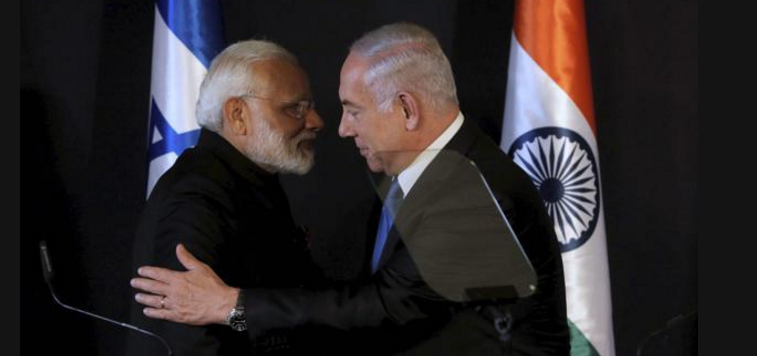Modi in Israel: Issues Beyond the Optics That Dazzled the Indian Media
SHASTRI RAMACHANDARAN

NEW DELHI: Prime Minister Narendra Modi’s three-day visit to Israel from July 4 to 6, the first ever by an Indian Prime Minister, is a historic departure with ramifications that may have been missed in the euphoric aftermath of the moment.
This was also the first time that a high-level Indian dignitary visiting Israel did not travel to Ramallah, the seat of the Palestinian Authority. Usually, visiting dignitaries are at pains to emphasise, at least, optical equality between Israel and Palestine, and make it a point to visit Ramallah. This act of omission – or is it commission? -- alone, it is observed, takes India-Israel relations to a new level.
Yet, PM Modi’s meeting with Israeli Prime Minister Benjamin Netanyahu being hyped as a hitherto “forbidden dalliance” and, for that reason, worthy of the romantic froth surrounding it, ignores the issues involved. The dazzling optics that distracted much of the media was, perhaps, intended to deflect focus from the practical, including problematic, aspects of the relationship.
The optics may have also been calculated to divert attention from the fact that PM Modi’s visit -- marking 25 years of full diplomatic relations -- is more to the advantage of the Netanyahu government than Modi Sarkar.
Contrary to the overblown, and misleading, reports, India-Israel ties have been out of the closet now for 25 years: from the time full diplomatic relations were established by Prime Minister P V Narasimha Rao. In the time since then, under the governments of H D Deve Gowda, I K Gujral, A B Vajpayee and Manmohan Singh -- well before PM Modi -- there has developed a bipartisan consensus on the usefulness of India’s relationship with Israel despite the avowed support to the cause of Palestine.
Significantly, China is also completing 25 years of diplomatic relations with Israel. One reason for both India and China finding the relationship “useful” was that Israel supplied the Asian giants with US defence equipment that Washington would not sell directly. That rationale is no longer relevant today when India is an important non-NATO defence partner of the US; and, many of the restrictions on transfer of technology and military supplies are no longer operative.
The two pillars of India-Israel relations are diplomacy and defence. A pragmatic appraisal would show that Israel needs India more than the other way round. At a time when the tide to isolate Israel – for its military atrocities against the people of Palestine -- is gaining across the world, there are few countries it can count upon; and, Israel is forever in quest of allies especially at the UN. Last year, India abstained from resolutions critical of Israel at the UN, the UNESCO and UNHRC. This was most welcome to Israel. As were the several high-level visits to Israel (before Modi’s tour), including by Home Minister L K Advani (2000), former President A.P.J. Abdul Kalam (2008), Home Minister Rajnath Singh (2014), President Pranab Mukherjee (2015) and External Affairs Minister Sushma Swaraj (2016).
These visits showed that the relationship has been out of the closet for 25 years. Except for a small section of the progressive elite and the Left parties, no political party is against India-Israel ties.
In the matter of defence, India is Israel's biggest buyer of military hardware worth billions of dollars. Besides the equipment, security cooperation between the two countries has meant sections of Indian forces adopting the mindset and methods of the Israeli soldiers, especially in dealing with strife in Jammu and Kashmir. Strategic affairs experts are divided on whether this is healthy and desirable.
Although PM Modi’s visit saw multiple agreements signed in not only defence and diplomacy but also agriculture, trade and water management, there remain disturbing and uncomfortable questions about security cooperation that will not go away. This is because anti-terrorism is not an area where Indian and Israeli perceptions and interests converge. Hence, it is difficult to see how there can be cooperation in this area.
Israel, by all credible accounts, is perceived as a “strategic” supporter of Islamic State and al-Qaeda for advancing its own security and territorial ambitions in West Asia. And, these two terrorist entities are a serious security threat to India. Israel is not in the least bothered by Pakistan-based terrorist outfits like LeT, JeM, Hizbul and the Taliban which unleash terrorist attacks against India and keep J & K on the boil. Therefore, any talk of anti-terrorism cooperation between India and Israel strains credulity. Actually, in the eyes of the Indian security and foreign policy establishment, Israel should be viewed as a terror state no different from Pakistan because it sponsors terror and is a state guilty of terrorist crimes.
Besides, there is an Israel-Saudi Arabia axis and a Saudi-backed “Islamic NATO” headed by former Pakistani army chief Raheel Sharif – a situation that should make India wary. In this complex and fraught scenario, when fear of hostilities breaking out in West Asia and the Gulf is real, India has to tread cautiously.
New Delhi should not be distracted from its core interests by Israel’s flattery, showmanship and bluster as these would be of little use in the event of India having to confront Pakistan or a hostile China, or dealing with terror outfits, including Islamic State, operating in the country and its neighbourhood.



